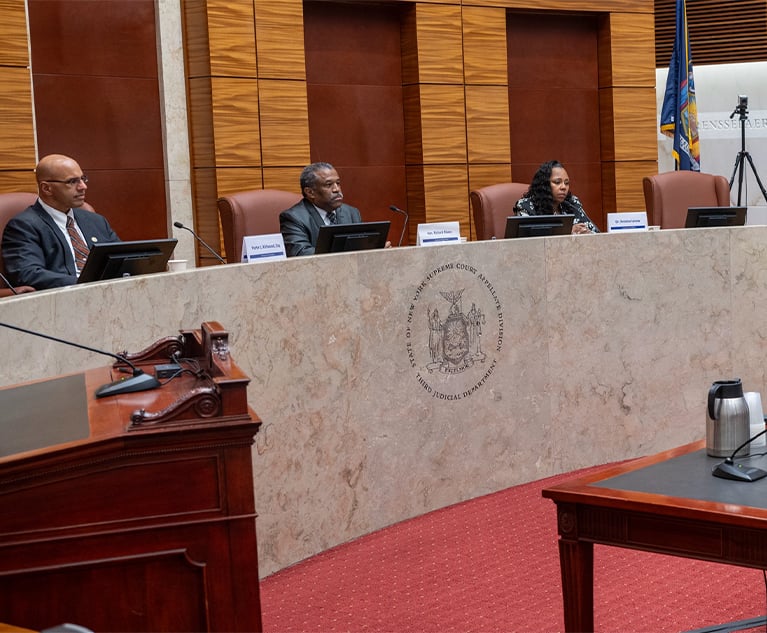Walmart Doesn't Have to Face Shareholder Lawsuit, Appeals Court Rules
The decision by the U.S. Court of Appeals for the Second Circuit preserves a ruling handed down last year in the Southern District of New York.
December 27, 2018 at 03:13 PM
3 minute read
 Photo: Shutterstock.com
Photo: Shutterstock.com
Walmart and a foreign subsidiary can be let off the hook from a lawsuit claiming shareholders lost money following the revelation that the rapid growth in Mexico may have been driven by a bribery scheme targeting government officials.
The decision by the U.S. Court of Appeals for the Second Circuit preserves a ruling handed down last year by U.S. District Judge Katherine Polk Failla of the Southern District of New York, who found that many of plaintiff Michael Fogel's claims regarding the subsidiary's conduct in 2005 were barred by the five-year statute of limitation under the Sarbanes-Oxley Act.
According to the Second Circuit's ruling, executives at Walmart de Mexico, or Walmex, began paying bribes to government officials in 2003 through intermediaries to obtain land use permits, reductions in environmental impact fees and other allowances.
Walmart conducted an internal investigation in 2006 and concluded there was no evidence of a bribery scheme.
But six years later, The New York Times published an expose detailing the alleged scheme in which government officials received $24 million, and an effort by Walmart executives to halt and cover up the internal investigation.
Following publication of the article, Congress announced the launch of a federal probe into the bribery allegations.
In his proposed class action suit, filed in 2013, Fogel alleges that, because of the bribery scheme and Walmart's misrepresentations in financial reports and Walmex's website, annual depository receipts in Walmex were overvalued from February 2012 to April 2012, when the Times published the article. For instance, Walmex's website stated that the subsidiary does “not tolerate, permit, or engage in bribery, corruption or unethical practices of any kind.”
Affirming Failla's ruling to dismiss the suit, a Second Circuit panel consisting of Judges Reena Raggi, Gerard Lynch and Christopher Droney said Fogel failed to show under what circumstances the company's statements about “honesty, integrity and ethical behavior” would rise “above the level of mere puffery.”
The judges also said they did not agree with Fogel's allegation that the “multi-year criminal enterprise” to bribe elected officials and bureaucrats to open new stores was a “classic example of a scheme,” finding it was mere speculation on Fogel's part that the Times article led to a reduction in new store openings in Mexico because executives could no longer pay bribes.
A team from Latham & Watkins consisting of Peter Wald, Melissa Arbus Sherry, Sarah Tomkowiak and Matthew Peters represented the defendants.
“We appreciate the court's careful consideration of the issues and are pleased that it has affirmed dismissal of these claims,” a Walmart spokesman said in a written statement.
Thomas McKenna and Gregory Egleston of Gainey McKenna & Egleston represent Fogel. Neither responded to a request for comment.
Read more:
NYSBA Says Justice Shouldn't Be Subject to Vagaries of Politics
Prominent Law Prof Pulled From Teaching Amid Sexual Misconduct Allegations
This content has been archived. It is available through our partners, LexisNexis® and Bloomberg Law.
To view this content, please continue to their sites.
Not a Lexis Subscriber?
Subscribe Now
Not a Bloomberg Law Subscriber?
Subscribe Now
NOT FOR REPRINT
© 2025 ALM Global, LLC, All Rights Reserved. Request academic re-use from www.copyright.com. All other uses, submit a request to [email protected]. For more information visit Asset & Logo Licensing.
You Might Like
View All

Law Firms Expand Scope of Immigration Expertise Amid Blitz of Trump Orders
6 minute read
'Reluctant to Trust'?: NY Courts Continue to Grapple With Complexities of Jury Diversity
Trending Stories
- 1Uber Files RICO Suit Against Plaintiff-Side Firms Alleging Fraudulent Injury Claims
- 2The Law Firm Disrupted: Scrutinizing the Elephant More Than the Mouse
- 3Inherent Diminished Value Damages Unavailable to 3rd-Party Claimants, Court Says
- 4Pa. Defense Firm Sued by Client Over Ex-Eagles Player's $43.5M Med Mal Win
- 5Losses Mount at Morris Manning, but Departing Ex-Chair Stays Bullish About His Old Firm's Future
Who Got The Work
J. Brugh Lower of Gibbons has entered an appearance for industrial equipment supplier Devco Corporation in a pending trademark infringement lawsuit. The suit, accusing the defendant of selling knock-off Graco products, was filed Dec. 18 in New Jersey District Court by Rivkin Radler on behalf of Graco Inc. and Graco Minnesota. The case, assigned to U.S. District Judge Zahid N. Quraishi, is 3:24-cv-11294, Graco Inc. et al v. Devco Corporation.
Who Got The Work
Rebecca Maller-Stein and Kent A. Yalowitz of Arnold & Porter Kaye Scholer have entered their appearances for Hanaco Venture Capital and its executives, Lior Prosor and David Frankel, in a pending securities lawsuit. The action, filed on Dec. 24 in New York Southern District Court by Zell, Aron & Co. on behalf of Goldeneye Advisors, accuses the defendants of negligently and fraudulently managing the plaintiff's $1 million investment. The case, assigned to U.S. District Judge Vernon S. Broderick, is 1:24-cv-09918, Goldeneye Advisors, LLC v. Hanaco Venture Capital, Ltd. et al.
Who Got The Work
Attorneys from A&O Shearman has stepped in as defense counsel for Toronto-Dominion Bank and other defendants in a pending securities class action. The suit, filed Dec. 11 in New York Southern District Court by Bleichmar Fonti & Auld, accuses the defendants of concealing the bank's 'pervasive' deficiencies in regards to its compliance with the Bank Secrecy Act and the quality of its anti-money laundering controls. The case, assigned to U.S. District Judge Arun Subramanian, is 1:24-cv-09445, Gonzalez v. The Toronto-Dominion Bank et al.
Who Got The Work
Crown Castle International, a Pennsylvania company providing shared communications infrastructure, has turned to Luke D. Wolf of Gordon Rees Scully Mansukhani to fend off a pending breach-of-contract lawsuit. The court action, filed Nov. 25 in Michigan Eastern District Court by Hooper Hathaway PC on behalf of The Town Residences LLC, accuses Crown Castle of failing to transfer approximately $30,000 in utility payments from T-Mobile in breach of a roof-top lease and assignment agreement. The case, assigned to U.S. District Judge Susan K. Declercq, is 2:24-cv-13131, The Town Residences LLC v. T-Mobile US, Inc. et al.
Who Got The Work
Wilfred P. Coronato and Daniel M. Schwartz of McCarter & English have stepped in as defense counsel to Electrolux Home Products Inc. in a pending product liability lawsuit. The court action, filed Nov. 26 in New York Eastern District Court by Poulos Lopiccolo PC and Nagel Rice LLP on behalf of David Stern, alleges that the defendant's refrigerators’ drawers and shelving repeatedly break and fall apart within months after purchase. The case, assigned to U.S. District Judge Joan M. Azrack, is 2:24-cv-08204, Stern v. Electrolux Home Products, Inc.
Featured Firms
Law Offices of Gary Martin Hays & Associates, P.C.
(470) 294-1674
Law Offices of Mark E. Salomone
(857) 444-6468
Smith & Hassler
(713) 739-1250







